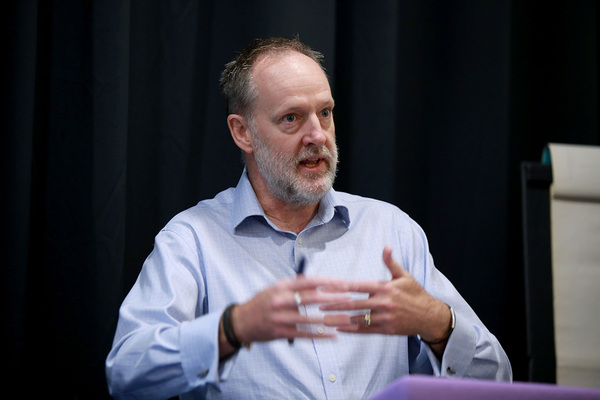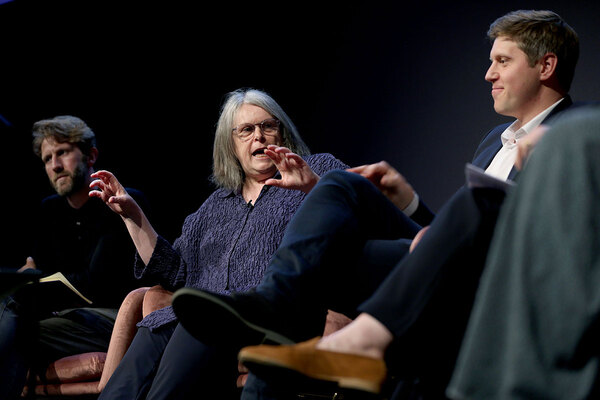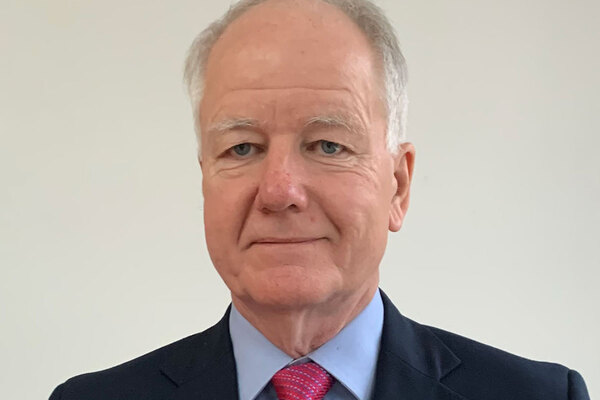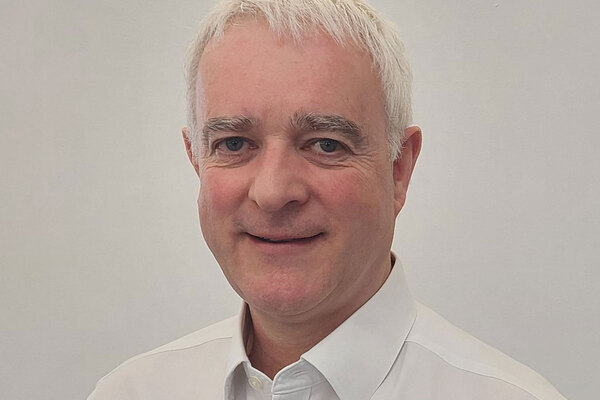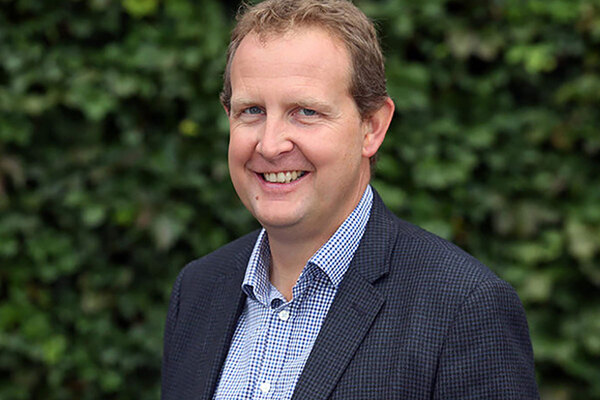You are viewing 1 of your 1 free articles
Meet the new guard: Sandra Skeete
Sandra Skeete has been one year in the job as chief executive of Octavia Housing. She talks to Jess McCabe about her plans for the future, taking over an organisation that has been run by the same person for 18 years – and how Octavia is weathering the pandemic. Photography by Tim Foster
Octavia Hill was a believer in self-reliance and aspiration. The 19th century social reformer, and one of the early pioneers of social housing, ran a network of housing schemes with around 3,000 tenants in the second half of the 19th century. Her philosophy was that the provision of good quality housing was a platform for residents to improve their lives – and she found herself quoted in the recent Social Housing White Paper saying: “Make lives noble, homes happy and family life good.”
Sandra Skeete has recently taken over as chief executive of Octavia Housing, the association that was founded by Ms Hill and bears her name and her legacy.
Ms Skeete shares the belief of Octavia’s founder that high-quality housing is a driving force for good. But in the 21st century, have those ideas of aspiration and reliance become bundled up in the white paper with a modern obsession with homeownership?
“It’s totally acceptable for people to aspire to live in good quality, affordable rented accommodation. That is a reasonable, an honourable and a noble – to use Octavia Hill’s words – aspiration. Someone shouldn’t feel stigmatised because their aspiration isn’t to own their home,” she says.
Most of the content of the white paper is clearly something Ms Skeete is happy to adopt. It is “what we’ve been used to in the past”, and “I’m not overly concerned about that”, she says about various proposals, pointing to them as pretty much a development of Octavia’s existing core values. But she hones in on the homeownership question in the proposals because it is about stigma – the issue that many were hoping the paper would address, but did not really feature too much. “There are still elements around stigma in the sector, and from my perspective as an organisation that respects its residents, and is always working hard to avoid that, the statements around social housing perhaps being a platform or a stepping stone to owner-occupation – it’s really understanding what that might mean in practice,” she says.
Inside Housing has taken the chance to sit down – over video chat – and talk to Ms Skeete a year after she took over the top job at the 5,000-home association, following the retirement of 18-year veteran chief executive Grahame Hindes. We wanted to find out more about Ms Skeete, her plans for the future of Octavia, and what makes her tick. As you might guess from her views above, she used the chance to reaffirm her commitment to some of the basic principles of social housing. But more on that later.
Ms Skeete’s first year has been focused more on stability than big changes – perhaps an inevitability given that the pandemic started only a few months after she took over. “My priority was making sure that transition was managed well… in terms of our residents feeling safe, that the organisation was in a safe pair of hands. I feel that I delivered on those things,” she says.
Still, a focus on stability does not mean no change at all. “For me, as a woman, [I was] walking into an organisation founded by a woman, standing against social injustice,” Ms Skeete says. “That puts me in a very, very different position to someone like Grahame. He did a fantastic job, and he’s handed me a fantastic legacy, but I want to take it somewhere else.”
So what is that different direction going to look like? Ms Skeete is cautious about giving too much away. She has been working with the association’s board on a new vision for the organisation that will come out, she says, in the beginning of the next financial year. But she talks in broad brush terms about the changes. Much of this centres on reaffirming but updating the legacy values of the organisation to the modern day.
We can expect a greater focus on working in the communities where Octavia has homes: central and west London. She says: “The term ‘community anchor’ is often used – for me it’s more around being knitted into the fabric of a local area, and really having our finger on the pulse of what’s needed.”
Sustainability is also likely to play a big role, and the organisation is reviewing its current target of upgrading all homes to EPC C by 2023, to see if it can go faster or further. About 75% have achieved this level (despite, Ms Skeete points out, the fact that 46% were built before 1919, making them challenging to retrofit). More broadly, Ms Skeete talks about a need to ensure “we grow sustainability”, and “have regards to the financial resilience of the organisation, that we consider our impact on the community and that we really do understand how when we grow the organisation, what the impact on the environment will be as well.”
This, she points out, links back to Octavia Hill’s own commitment to the environment, as a founder of the National Trust, and an emphasis on building homes that pay attention to the quality of people’s environment.
In the short term, Ms Skeete’s focus is on surviving the pressures of the pandemic. “The main thing must be making sure we come through this period as a resilient organisation, and that’s partly in terms of financial strength but also our people because the pressure on staff is immense,” she says. “Some of our workforce have been furloughed, we’ve got people who work in care. It does put stresses and strains on people, so that would be the number one in terms of coming through this as a connected, resilient, strong organisation.”
Like most associations, any changes have to bear in mind the wider situation – with costs ratcheting up from development plans, fire safety costs and decarbonisation of homes, not to mention whatever is about to happen to the economy in 2021, and what impact that might have on residents and, as a knock-on, rental income. Unlike many other chief executives, Ms Skeete is not rushing to promise a huge increase in new homes being built.
Last November, Octavia was downgraded from V1 to V2 by the regulator, which noted its increased investment in development and its existing homes. “We still have a viable business and V2 is nothing to be ashamed of really,” says Ms Skeete. “I think it shows that we are using our assets or our financial strength to do more. But we’re constantly keeping under review whether we continue with the existing targets or whether we reduce our aspirations.”
“Over the last few years we’ve had quite an ambitious development programme given our size, about 200 homes a year, around 5% of our current portfolio,” Ms Skeete continues. “We’re exploring whether we could sustain that level of development or whether we should reduce that to give us more capacity. Those are live conversations in the organisation.”
Ms Skeete has worked in social housing for 30 years, and she’s one of the unusual few who intentionally aimed for a housing career, rather than stumbling into it. And unlike many housing CEO appointments, Ms Skeete’s background is firmly on the housing management side as opposed to finance or development. It is something she sees as an advantage.
“Once you’ve seen and experienced first hand the challenges of providing a housing service, how your organisation’s policies and service delivery impacts on staff and residents, for me that has always stayed with me and it’s really shaped my leadership style in terms of making sure that I always find ways of staying connected and hearing those voices,” she says.
She grew up in east London (where she still lives), and was “acutely aware” of the housing discrimination cases that were unfolding in the 1980s – referencing the landmark 1984 case in Hackney that exposed racism in council housing allocations.
“I think also being a child of the Windrush generation and growing up always hearing those stories about the early years in the UK – my family often talked about the issues around housing, and how that impacted on them and their friends and their ability to settle in the UK, and employment as well.
“So I was always very aware of the importance of housing to people being able to follow their dreams and support their families and improve their lot,” she recalls.
After graduating from the University of Greenwich with a degree in political economy, she started to apply for jobs at housing associations. Not getting anywhere, a friend suggested she approach Tony Soares, then the chief executive of Ujima Housing Association, and offer to volunteer. Mr Soares suggested an alternative idea: that Ms Skeete should apply to the PATH Traineeship, a new scheme setting up in London to encourage BAME people to go into housing.
“I applied successfully, was placed at One Housing, and as they say, the rest is history,” she recalls.
What followed was a storied career. By 1996, when Ms Skeete was 30, she had her first chief executive role – leading what was then the Refugee Housing Association, part of Metropolitan. She has since worked at Westminster’s ALMO CityWest Homes and Peabody, as well as in a handful of other jobs. In 2019, she returned to One Housing, which gave her that first job, this time as a board member.
“What I have been particularly keen to do in my time in housing is work for those organisations that, yes, have a social purpose and provide quality housing, but also do a lot more than that as well,” Ms Skeete summarises.
Along the way, she has acquired a fine reputation. Steve Douglas, chief executive of homelessness charity St Mungo’s and housing sector veteran of many roles, says: “I’ve known and worked with Sandra at various times during her career. She is a vastly experienced housing professional, with a strong focus on housing management and customer care. Thoughtful and considered, she doesn’t speak unless she has something meaningful to say, and it is usually insightful.”
And now back to Octavia. Out of the 50 biggest housing associations in the UK, Octavia is, Inside Housing understands, the only one to be led by a Black woman, and also one of only a very small number of Black people to lead a large, mainstream association.
“We should be further ahead now,” Ms Skeete acknowledges. “It’s a question for board rooms really, in terms of how they feel we’ve progressed on this subject. Because, looking in, it doesn’t seem as though we are where we should be.”
When I ask about the proudest moment of her career so far, Ms Skeete pauses before saying: “I have managed, despite many, many challenges, to ensure that my voice has been heard. I think that’s probably the biggest achievement, because I’ve often been in the room where people would probably prefer not to hear my voice. In fact, they’ve been quite explicit about that at times. I have had to find ways of making sure that’s happened.”
It seems certain that we will be hearing more from Ms Skeete in the years to come.
Sign up for our Week in Housing newsletter
Already have an account? Click here to manage your newsletters

